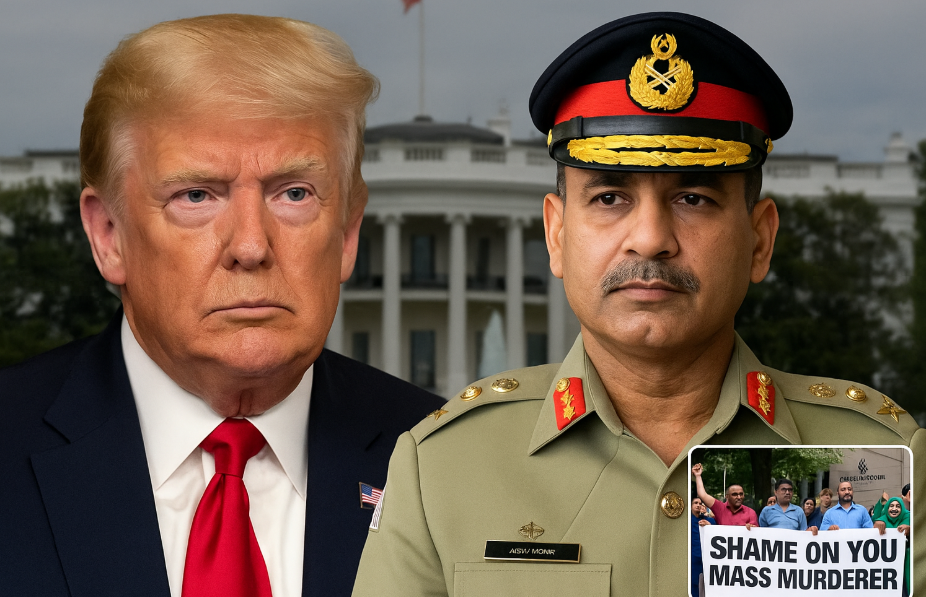President Trump Hosts Pakistan Army Chief Munir:US President Donald Trump hosted Pakistan’s Army Chief Field Marshal Assam Munir at the White House, discussing Iran’s conflict, possible US military base access, and rare earth mineral deals, as Pakistan balances between US and China.
President Trump Hosts Pakistan Army Chief Munir
US President Donald Trump recently hosted Pakistan’s Army Chief, Field Marshal Assam Munir, at the White House in a highly significant diplomatic move. This historic lunch meeting marked the first time an American president officially hosted the head of Pakistan’s army. While publicly framed as a simple diplomatic engagement, the discussions that transpired behind closed doors hint at complex geopolitical dynamics, especially in light of the ongoing Iran-Israel conflict.
During a media briefing, President Trump emphasized Pakistan’s deep understanding of Iran, stating that they know Iran better than most. Pakistan shares a long and complex border with Iran, stretching over 900 kilometers, which places it in a geographically and politically sensitive position amidst the escalating Middle East tensions.
The two neighboring countries have four key border crossings, although these have been temporarily shut due to the ongoing conflict. Pakistan’s government has openly condemned Israel’s air strikes against Iran, describing them as violations of international law that threaten regional stability.
Reports suggest that during the meeting, Field Marshal Munir conveyed Pakistan’s growing concerns to President Trump. The Pakistan Army is deeply apprehensive about the possibility of Iran’s regime being toppled, a scenario that could trigger significant instability along Pakistan’s western frontier. Munir reportedly warned of potential cross-border unrest fueled by militant groups that might exploit any power vacuum in Iran. Such developments could result in a spillover of violence into Pakistan, putting Islamabad in a precarious security situation.
While the public conversation mainly focused on Iran, analysts believe that President Trump may have had additional strategic objectives during his meeting with Munir. One possibility is that Trump might have sought Pakistan’s permission to once again utilize its air bases. These facilities were extensively used by US forces during the Afghanistan war and are well-tested operational hubs. If the Iran-Israel conflict escalates into a broader regional war, access to these bases could be crucial for US military operations.
Another area of possible discussion revolves around Pakistan’s rich mineral reserves, particularly in rare earth elements, lithium, and copper. The United States has been actively pursuing deals to secure rare earth minerals worldwide, including discussions with Ukraine. A similar deal with Pakistan could provide the US with strategic access to essential resources critical for high-tech industries and defense manufacturing.
Any mineral deal between the US and Pakistan would likely draw significant attention from China. Beijing already maintains a substantial footprint in Pakistan through the China-Pakistan Economic Corridor (CPEC), a key component of its Belt and Road Initiative. The US-China rivalry for influence over Pakistan adds another layer of complexity. If Pakistan leans towards an American mineral deal, it risks straining its strategic partnership with China, upon which it heavily depends economically and militarily.
Field Marshal Munir’s visit underscores Pakistan’s delicate balancing act. Caught between two global superpowers, Islamabad must navigate its foreign relations with extreme caution. One misstep could isolate Pakistan or further entangle it in conflicts that threaten its national security and economic stability.
However, General Munir’s visit to the United States has not been free from domestic controversy. Upon his arrival at the Four Seasons Hotel in Washington, D.C., Munir faced strong protests from overseas Pakistanis, many of whom are supporters of former Prime Minister Imran Khan’s party, Pakistan Tehreek-e-Insaf (PTI). Protesters chanted slogans such as “Shame on you,” “Mass murderer of Pakistanis,” and “Killer of Islamabad,” expressing their opposition to Munir’s policies and role in Pakistan’s recent political upheavals.
The demonstrations, largely organized by PTI USA, were pre-planned and heavily promoted on social media. PTI activists shared videos on platforms like X (formerly Twitter), highlighting the protests and accusing Munir of crimes against the people of Pakistan. The party has been consistently vocal against the Pakistani military establishment, especially since the ousting of Imran Khan, and has used every international platform to raise awareness about alleged human rights violations back home.
Although the White House meeting appeared to be a routine diplomatic engagement, the underlying discussions reveal high-stakes negotiations that could reshape regional alliances and global power dynamics. As tensions in the Middle East continue to rise, the world will closely watch how Pakistan positions itself amid the evolving geopolitical landscape.
Disclaimer:
The information presented in this article is based on available reports, media briefings, and expert analysis. The details regarding discussions between US President Donald Trump and Pakistan’s Army Chief Field Marshal Assam Munir are speculative and not officially confirmed by either government. Readers are advised to consider this article for informational purposes only and follow official government statements for verified updates.

